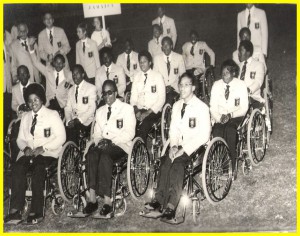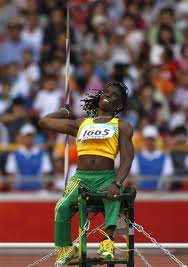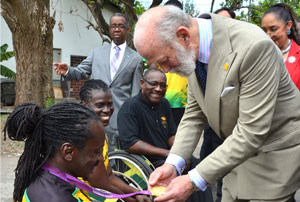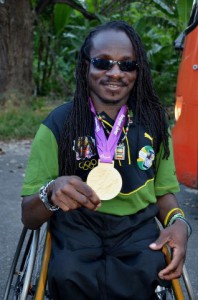The history of sports at the SJGRC

Jamaica has the highest number of medals in international paraplegic sports
per capita in the world. All the athletes that represent the Jamaican team
train at the SJGRC. The vast majority of them are past patients of the
Centre and use sport as a critical path to recovery. Until 1980, the
Jamaican athletes with the most medals and world records were disabled.
In 1966, Sir George Bedbrook, President of the Commonwealth Wheelchair Games Federation, requested that the Mona Rehabilitation Centre (now the Sir John Golding Rehabilitation Centre) consider holding a competition in Jamaica. Using sports had not been considered of importance in the overall programme directed towards rehabilitating patients until that time, but the staff realized that a sports programme could help to stimulate their determination to overcome their disabilities.
Yet, there was precedent for success. Years earlier, a swimming pool had been built at the Centre out of money given by the Knutsford Park Sweepstake funds. Under coach John E. Lopez, young disabled patients had been trained in competitive swimming. They had competed in primary school swimming championships against able-bodied children on level terms. On two occasions, this group had won the Gold Challenge Cup swimming award for girls. The boys had done nearly as well.

A group of friends of the Centre started working to provide the facilities necessary to hold international games. Several hundred severely disabled people in wheelchairs had to be accommodated and fully looked after. The Centre’s newly formed Sports Committee, with the help of Ben Lipton, President of the United States Paraplegic Association, put on one of the most organized meets ever held in August 1966. Jamaica fielded a team of five athletes; they won four Gold, one Silver, and four Bronze medals.
A brief history of the Paralympic Games
The term ‘Paralympic’ derives from the word ‘Olympic’ and the suffix ‘Para’ a Greek preposition, which means ‘close to’. The vision of the International Paralympic Committee is: “To Enable Paralympic Athletes to Achieve Sporting Excellence and Inspire and Excite the World”.

The origin of the Paralympic Games dates back to 1948 when Sir Ludwig Guttman, a neurologist at Stoke Mandeville Hospital, England staged a sports competition for people with spinal cord injuries involving World War II veterans. The Games were organized to coincide with the 1948 London Olympic Games and on the day of the Opening Ceremony, the Stoke Mandeville Games were launched. Thus the first competition for wheelchair athletes was organized. Four years later, athletes from the Netherlands joined the Games and thus the international movement, now known as the Paralympic movement was born.
Olympic style Games for athletes with a disability were organized for the first time in Rome in 1960, immediately after the Olympic Games. They are considered the first Paralympic Games.

The sports are athletics, wheelchair basketball, tennis, fencing and rugby, equestrian, sailing, goalball (a game strictly for the blind), table tennis, boccia, 5-a-side and 7-a-side football, sitting volleyball (for amputees only), judo, shooting, cycling, swimming and powerlifting.
Jamaica and the Paralympic Games
In 1968, Jamaica attended their first Paralympic Games. The country has attended every Paralympic Games since then, except 1976; that year, Jamaica had assembled their largest team ever to attend the Paralympics but chose to boycott the Games.
Jamaica’s performance was outstanding in the 1972 Paralympic Games in Germany where the team won a total of 16 medals – six gold, six silver, and four bronze medals. The team also performed very well in the Games in Holland in 1980, winning eight gold, three silver, and three bronze medals. Jamaica has won medals at all Paralympic Games except the Sydney Games in 2000.
The Jamaica Paraplegic Sports team has gone all over the world promoting the idea of sports for the physically challenged by the outstanding success of the athletes. It can safely be said that no small country has come anywhere near to Jamaica in the number of gold medals and world records accumulated over the years through hard work and determination.


